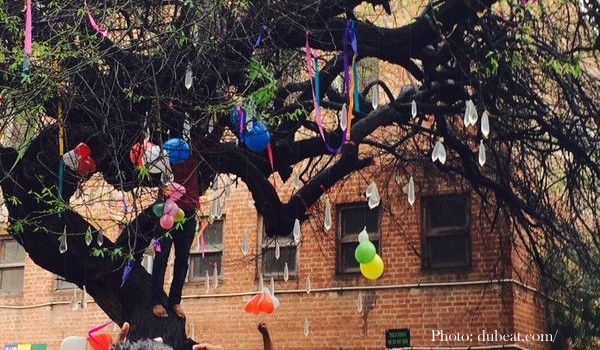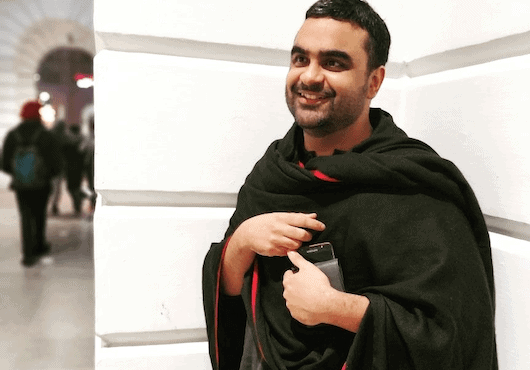Day 2 of Mecca, the annual cultural fest of Hindu College saw various music and dance competition and ended on a glorious note with Papon’s magical performance, Let’s look at the events that took place.
The unfortunate and perplexed weather conditions delayed many of the events at Mecca Day 2. However, despite the erratic weather shifting between sunlit and dewy, Hindu College hosted a massive crowd in its premises.
One of the first events to start today was Jagerbob: Battle of Bands organised by Aria: The Western Music Society. The event witnessed amazing musical performances by various societies from across the varsity.
The light drizzle managed to delay the event but failed to drizzle on the spirits of the performers. The winning band Firdaus from Ramjas College presented a deservingly winning performance. Anhad from Keshav Mahavidyala finished second.
Aarambh, the western dance society of Hindu College organised Firestone, the western dance competition as part of its Annual Dance fest “Aramya” sponsored by OMC, Insight One, Love Grill and Ozone. The event saw participation from 13 teams from across different colleges which was adjudged by Mr Sahil Aneja aka Sazzie, founder of BADA and a Dance India Dance participant. The auditorium was full of enthusiastic dance lovers who enjoyed all the dynamic performances. Enliven, the western dance society of Gargi College came first while the second position was shared by Spardha from Shaheed Bhagat Singh College and CVS Zest.
Also, as a part of “Aramya” Srijya, the choreography society of Hindu College organised Finesse, the choreography competition. This event was judged by Ms Jhilmil Modi, a trained dancer in Jazz, ballet and contemporary who has been teaching in Danceworx Academy and is currently heading the GK-1 studio along with Ragini Bhajanka, who has performed in various pieces of the Danceworx Company Repertoire choreographed by many Indian and International artists. LSR Dancesoc came first while second position was bagged by Sensation from Kirori Mal College and Adagio from Kamala Nehru College came third.
Alankaar, the Indian Music Society of Hindu College, organised two magnificent competitions. The perfect ambience was created with the venue covered with black sheets and fairy lights adorning the room, echoing with heartwarming music. First was the instrumental solo competition, where Soumendra from Sri Venkateshwara College emerged as the winner. Rohan Prasanna from Hansraj College and Nandu Krishnan from Satyawati College were awarded the second and third position.
The same society organised Jugalbandi, the duet competition where Upasna and Padmaja from Indraprastha College for Women bagged the first position with their soulful and splendid music. Shounak, from Ramjas College, and Nandu, from Satyawati College stood second. Daulat Ram College’s Navya and Vasudha came in third with their melody.
The Zoology Lawns hosted Snap, the annual photo exhibition of the college. Organised by Vivre: The Film and Photography Society, the exhibit saw some splendid shots clicked by the society members on display. Covering themes like culture, light, and symmetry, the exhibit was a vision for the eyes. Vivre also organised an On The Spot Photography Competition and a Film-making Competition with a unique one-minute movie-making concept. The results for both the events are awaited.
Manthan, Hindu College’s Quiz Society organised it’s quiz competition on the theme India. A team comprising of Kanika Yadav, from Miranda House College, and Ashish Singh, from Ramjas College, emerged as the winners of the competition. Abhishek Paliwal, from Ramjas College and Adil Jacob, from Jamia Milia Islamia University comprised the team coming second.
Day 2 of Mecca came to an end with Papon’s musically enchanting performance, opened by the band “Shadow and Light”, powered by Redbull Music India. Papon captivated the audience with his Assamese songs that won the crowd over, as everyone performed their own versions of Bihu. The crowd enjoyed his melodious tunes when he sang some of his famous songs like ‘Itti si khushi’ and ‘Moh moh ke dhaage’. The crowd was managed well and saw no ill behaviour.
However, once during the concert, Papon mentioned, “Believe in yourself, and not everything that you see on the internet.”
There had been some conflict about Papon performing at Mecca. The alleged accusations against him that had defiled his creative image, went on to trigger questions among the audience whether it was entirely justified to participate and indulge. As observed by us, the audience had conflicting views about the issue. Some of them felt that the alleged accusations could be overlooked. However, many others were of a more strict bent of mind. Despite the wonderful performance by Papon, it could not entirely remiss the stigma attached to him due to some allegations. The idea remained that even in this conflict of art and the artist, we must maintain a sensical sensitivity about the issue.
Kartik Chauhan
Sakshi Arora
Shivani Dandhwal
















